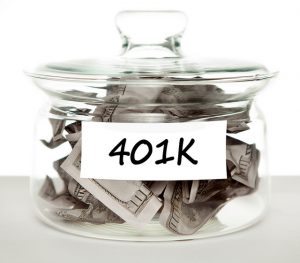A 401k is an employee sponsored plan that allows you to save for retirement by contributing part of your earnings tax-deferred (meaning you won’t have to pay taxes on the money you put into your 401k until you take it out). Your retirement savings are put into investments of your choice so that you can earn a compounded return on your money over time. Some employers “match” part or all of your 401k plan contributions.
Don’t Wait to Start Participating in Your 401k Plan
If you just graduated, and money is tight, you might think you are too young to be saving for retirement until your later years. It’s actually much more difficult for someone to start saving for retirement at 40 than it is at 25. During those 15 years that you didn’t save for retirement, you will miss out on significant savings and compounded returns on your money. Take this example:
Example:
Part 1: You start investing 10% of your $40,000 income at age 25. With a 3% raise per year and an 8% return on your money over time, you will retire with $1,540,248 by age 65.
Part 2: In the same example above, if you start contributing to the 401k plan when you are 40 years old with the same salary and return rate as above ($62,311 at 40 years old after raises), you will retire with only $803,289 by age 65. That’s about half as much!
401k Plan Employee Match
Does it really make a difference that your company “match” your 401k plan contributions? Yes, it does. It’s like receiving free money and getting the benefit of compounded returns on the employer contributions until you retire. When you look for a place to work, take into consideration the added benefit of a company that offers employee matching on their 401K Plan. Always ask your potential employer about their 401k plan and matching efforts. Let’s see how much the employee match helps by continuing the example above:
Example:
In Part 1 of the above example, if your employer matched half of your contributions until you retired, you would end up with $2,310,378. That’s an additional $770,130 for your retirement that you didn’t pay for!

